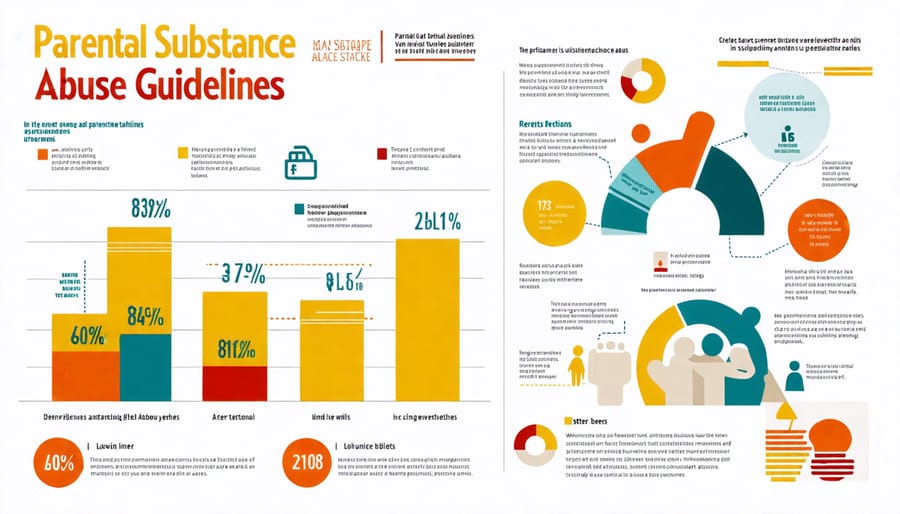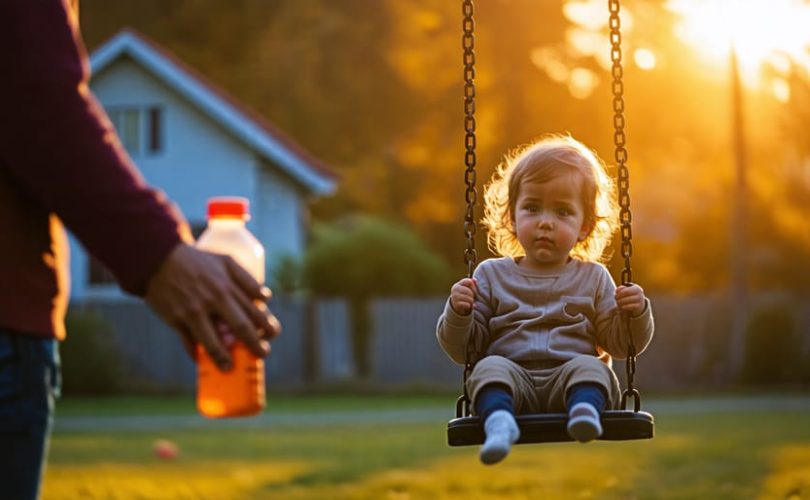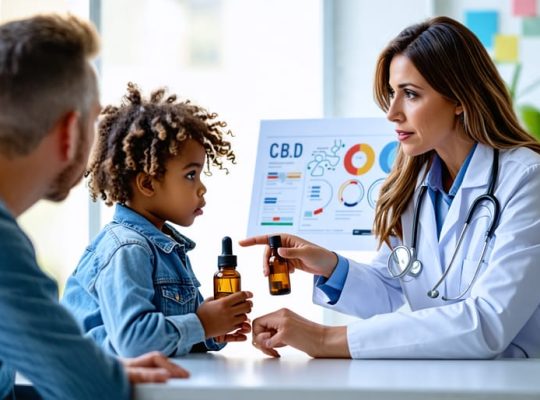Recognize the impact parental substance abuse can have on children by observing behavioral changes or emotional distress as key indicators. Support affected children by promoting open communication and offering them a safe space to express their feelings. Connect with local or national support groups to access resources and share experiences that help manage the situation. Collaborate with teachers and healthcare professionals to create a well-rounded support network, ensuring children receive consistent care and understanding across different environments. Prioritize self-care and seek professional guidance, if needed, to maintain your well-being and be a resourceful support system for the child involved.
Understanding Parental Substance Abuse
Defining Substance Abuse
Substance abuse, when viewed through the lens of parental behavior, involves the ongoing misuse of drugs or alcohol that affects the ability to parent effectively. This form of abuse isn’t just a pattern of addiction; it’s a situation where substance use disrupts daily life, leading to harmful consequences for both the parent and child. Those struggling might face challenges maintaining routines, providing emotional support, or ensuring a stable environment. When parents face such difficulties, children may feel confused, neglected, or unsafe. Understanding these dynamics is crucial for fostering an environment where families feel supported and children remain resilient.
Common Substances Involved
Parental substance abuse often involves a variety of common substances, each with its unique challenges and impacts on family dynamics. Alcohol is frequently abused due to its accessibility and social acceptance, leading to potential emotional and developmental issues in children. Opioids, including prescription medications and illicit drugs like heroin, are a significant concern, often resulting in neglect and instability in the home. Stimulants such as cocaine and methamphetamines can cause erratic behavior, affecting a parent’s ability to provide appropriate care. Additionally, marijuana, though increasingly legalized, can impair parental judgment and attention. Understanding these substances helps in identifying, supporting, and intervening in families affected by addiction.

Statistics on Parental Substance Abuse

Prevalence and Trends
Parental substance abuse is a pressing issue that affects countless families, often leaving children in vulnerable positions. Recent studies indicate that approximately one in eight children in the United States lives with at least one parent who struggles with substance use disorder. This troubling statistic highlights the significant reach of this issue. Over the past decade, the opioid crisis has exacerbated the situation, with increasing trends in prescription drug misuse contributing to the rise in parental substance abuse.
It’s important to understand that behind these numbers are families facing daily challenges. For instance, children of parents who misuse substances often experience emotional and behavioral issues, struggle academically, and may even face neglect. Notably, experts emphasize that these children are at a higher risk of developing substance use issues themselves unless they receive appropriate support and intervention.
Recognizing these statistics can be a catalyst for change, leading to more informed efforts by teachers, healthcare professionals, and parents to provide the needed care and support for these affected families.
Demographic Insights
Parental substance abuse is a multifaceted issue affecting families across various demographics, though certain patterns can be observed. According to experts, this challenge transcends race, income, and geography, impacting children in both urban and rural settings. However, studies indicate higher prevalence in economically disadvantaged communities, where stress and limited access to mental health services can exacerbate issues. It’s crucial for parents, teachers, and healthcare professionals to understand these dynamics to offer effective support. Personal stories often reveal common themes of instability and emotional distress among affected children, underscoring the importance of creating nurturing environments to mitigate these impacts.
Effects of Parental Substance Abuse on Children
Mental Health Challenges
Growing up with a parent who struggles with substance abuse can significantly affect a child’s mental health, often in profound ways. These children may face a range of emotional and psychological challenges, including anxiety, depression, and feelings of unworthiness. The unpredictable nature of their home environment can lead to a lack of trust and a deep-seated fear of abandonment. Navigating these challenges alone can be overwhelming, but understanding the impacts, such as those stemming from childhood trauma, can foster empathy and support for these young individuals. Expert opinions emphasize the importance of providing a safe and consistent environment where children feel heard and valued. Communities can play a vital role by offering support systems like counseling and peer groups, which can help mitigate the adverse effects of their home life. This understanding can empower parents, teachers, and healthcare professionals to start meaningful conversations and offer heartfelt support.

Long-Term Consequences
Growing up in an environment where parental substance abuse is present can have profound and lasting impacts on children. These young individuals may face emotional challenges, such as feelings of neglect, anxiety, and depression, which can influence their development and sense of self-worth well into adulthood. Often, they might struggle with forming trusting relationships or expressing emotions in healthy ways. In interviews, many adults who experienced such environments as children share stories of feeling isolated and burdened with responsibilities beyond their years.
Research suggests that children of parents struggling with substance use disorders are at greater risk for academic difficulties, which can lead to limited career opportunities later on. This impact often stems from disruptions in their educational environment, compounded by the lack of parental support and involvement. Additionally, these children may be more susceptible to adopting similar behaviors, indicating a potential cycle of substance abuse that can perpetuate through generations.
Healthcare professionals emphasize the importance of early intervention and the need for supportive resources. Teachers and caregivers play a crucial role in recognizing signs of distress and fostering a stable and nurturing environment. By understanding the potential long-term effects, we can collectively work towards creating a supportive network aimed at breaking the cycle of substance abuse and promoting healthier futures for these children.
Supporting Children and Families
Community and Government Resources
Facing the challenges posed by parental substance abuse can be overwhelming, but no family has to go through it alone. Many resources are available to help parents, children, and caregivers. National helplines offer 24/7 confidential support, guiding those in need towards breaking the cycle of addiction and rebuilding healthy family dynamics. Local organizations provide tailored assistance, counseling, and education programs. Healthcare professionals can play a key role, offering compassionate advice and connecting families with vital community support systems. Schools, too, are pivotal, providing safe spaces and understanding mentors to help children navigate emotional hurdles. Additionally, nonprofit organizations often host workshops and support groups designed to address the unique needs of families dealing with substance abuse. By tapping into these resources, families can find hope and strength. For more examples of uplifting initiatives, explore how breaking the cycle of addiction creates positive change or how community support initiatives uplift children’s mental health.
Strategies for Teachers and Healthcare Professionals
In the face of parental substance abuse, teachers and healthcare professionals play a vital role in providing stability and support to affected children. Teachers can create a nurturing classroom environment by recognizing signs of trauma and offering consistent support. Building trust through positive reinforcement and patient communication helps children feel safe at school. Educators might include activities that promote emotional expression, like art or storytelling, allowing children to process their experiences creatively and safely.
Healthcare professionals, including doctors and nurses, can make a significant impact by conducting thorough health assessments and being alert to behavioral changes associated with stress or anxiety. Offering compassionate, nonjudgmental care is essential to building trust. Professionals can also provide resources such as counseling or child therapy options, assisting families in finding the right help. Collaboration between teachers, healthcare workers, and social services ensures a comprehensive support network, helping children to overcome challenges posed by parental substance abuse.
Personal Stories and Expert Insights
Growing up with a parent battling substance abuse can be a confusing and painful experience, as shared by Lisa, a school counselor who fondly recalls her childhood memories overshadowed by her father’s drinking. “It was difficult to concentrate in school when I was constantly worrying about what I’d go home to,” she reflects. Lisa’s story is a testament to the hidden struggles many children face in these environments. She emphasizes the importance of offering a safe space for children to express their feelings. “Every concerned adult in a child’s life has a chance to be a lifeline,” she says.
Experts like Dr. Amelia Johnson, a child psychologist, echo Lisa’s sentiments. Dr. Johnson highlights that children often internalize guilt and shame, mistakenly believing they are at fault. She suggests regular, age-appropriate conversations to reassure children that they are not responsible for their parent’s addiction. “Simple language and empathy can make a significant difference,” she notes.
Through their stories and insights, both Lisa and Dr. Johnson underline the critical role of understanding and support. Parents can create this nurturing environment by openly acknowledging the situation and seeking help. Together, with caring adults and professionals, children can be guided towards healing and resilience.
Conclusion
In conclusion, understanding the profound impacts of parental substance abuse on children is crucial for those in caregiving and educational roles. Children living in these environments often face emotional and developmental challenges, ranging from feelings of neglect to the risk of developing similar patterns of behavior. Through personal narratives and expert insights discussed, we see the importance of nurturing environments and the resilience children can possess when given the right support. It’s heartening to know that numerous resources and support systems are available to assist affected families. Whether it’s through professional counseling, community programs, or educational interventions, there are pathways to help children heal and thrive despite challenging circumstances. As we foster a more supportive community, we can work together to mitigate these impacts, ensuring every child has the opportunity to flourish. Remember, reaching out for assistance is a vital first step towards healing and change for both parents and children alike.







